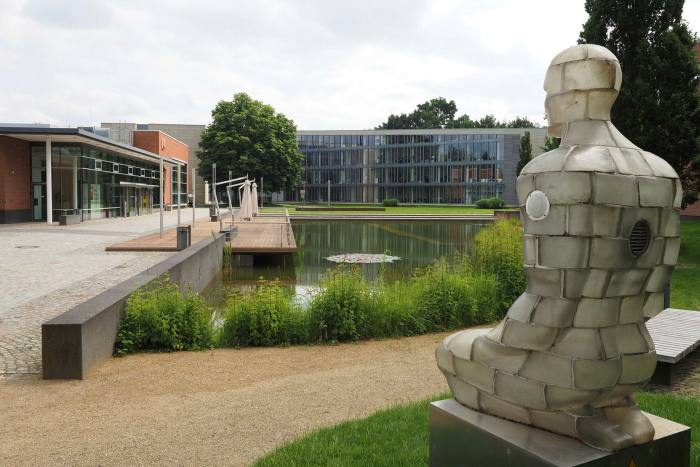The personal foundation of SAP’s chair, Hasso Plattner, played a larger role than previously known in a controversial spinout of the German software giant’s highly profitable financial services industry division.
The Hasso Plattner Foundation is the largest single investor in the spinout and provided the majority of the initial cash for the joint venture between SAP and businessmen with links to Plattner, the Financial Times has learned.
The revelations shed fresh light on the nature of the deal and SAP’s disclosures about it last year. The company had previously described the joint venture as a “strategic partnership” with a Munich investment firm called Dediq without mentioning the Plattner charity’s involvement.
SAP, Europe’s largest software company, said in April 2021 it was hiving off its FSI unit into an entity co-owned by Dediq. SAP would own a 20 per cent stake while Dediq would invest more than €500mn for an 80 per cent stake, it said.
Major SAP investors raised concerns about potential conflicts of interest after the Financial Times and Handelsblatt reported that HPF was an undisclosed investor in the deal. In July 2021, HPF said it would unwind its position.
At the time, the parties declined to disclose the scale of the HPF’s investment. The FT has established that as of November last year, HPF had provided €190mn of an initial €310mn invested at that point by the Dediq investors.
Almost nine months after pledging to sell off its shares, HPF remains the owner of 46 per cent of Dediq’s four-fifths holding in the joint venture, SAP Fioneer, according to German corporate records. Overall, this means the charity controls a 37 per cent stake in SAP Fioneer.

The holding indicates that HPF was not just a secret investor behind the transaction when SAP first announced the deal last year, but in fact the largest investor and the key source of initial funding for the joint venture.
A HPF spokesman noted that it was previously reported that the foundation was a significant but not a majority investor in the deal. He said the divestment process had been ongoing since the Fioneer transaction closed in September.
“‘They are confident they will find investors, but it is not as easy as some people might have thought because the deal is not for everybody,” the spokesman said, noting that the failure to find a buyer so far was evidence that HPF had not secured a special deal from SAP.
“The agreement is that it’s more important to find the right investor then to find a quick solution,” he added.
SAP is the second-largest company on the German stock exchange, with its enterprise software products giving it a $135bn valuation and a reputation as a rare European answer to American and Chinese tech giants.
The company has made Plattner, who helped found SAP in 1972 and is still its largest shareholder and chair, one of Germany’s richest and most influential entrepreneurs.
The 78-year-old set up the Hasso Plattner Foundation in 2015 and the charity’s activities span education, art and culture, and conservation. The foundation says its endowment “aims to generate high, risk-adjusted returns” to fund its operations.
Plattner is the charity’s “strategic adviser in all matters of business”, according to its website. HPF and SAP have insisted he played no role in the Fioneer deal, though he was consulted on the decision to unwind HPF’s stake, the charity previously said.
SAP’s FSI unit was generating €325mn in annual revenues and was profitable at the time of the joint venture deal. The complicated terms of the transaction meant only €154mn of the unit’s sales moved to the Fioneer joint venture initially.
SAP recorded a €77mn net gain on disposal in its 2021 annual report, relating to the transfer of employees and intellectual property into the 20 per cent-owned joint venture. The figures imply a €385mn valuation for Fioneer.
A spokesman for SAP declined to comment on the valuation figure. SAP said last year that outside advisers Duff & Phelps and Gleiss Lutz had reviewed the transaction after HPF’s involvement was revealed and found no problems with the valuation or approval process.
The software giant has said it chose Dediq for its financial services skills, its commitment to the venture, and its “readiness to invest”. SAP’s chief financial officer, Luka Mucic, told reporters at the time it was “an entity that many of you might not immediately be familiar with”.
Dediq itself has links to the Plattner family. The firm is owned by Matthias Tomann and has previously invested alongside Hasso Plattner’s family office and Rouven Westphal, an executive who runs Plattner’s charity. Westphal was appointed to SAP’s supervisory board in May 2021.
In a 2018 presentation, Dediq called Hasso Plattner’s family office its “co-investor” whose funds it invested alongside its own. The firm’s website today says its capital “comes from the partners at Dediq and a big co-investor”, who is not specified.
Tomann is personally the second-largest investor in the joint venture. He has effective control of the business through sole ownership of the shares with full voting rights in the holding company that owns most of Fioneer.
Dediq said the terms of the deal were standard for private equity investments. The firm said it would invest further cash into Fioneer over time “as planned and committed”, with the timing “depending primarily on add-on acquisitions”.
The other investors are three Dediq partners, an executive now at Fioneer who previously ran a company backed by Plattner family members, and the wife of a M&A lawyer who advised Dediq on the joint venture deal and has previously advised Hasso Plattner’s venture capital firm.











